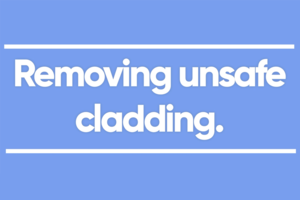Government to bring an end to unsafe cladding with multi-billion pound intervention
Housing Secretary unveils a 5-point plan which will provide reassurance to homeowners and confidence to the housing market.

- Housing Secretary announces the government will pay for the removal of unsafe cladding for all leaseholders in high-rise buildings, providing reassurance and protecting them from costs
- New levy and tax on developers to ensure industry contributes
- Measures will boost the housing market and free up homeowners to once again buy and sell their properties
Hundreds of thousands of leaseholders will be protected from the cost of replacing unsafe cladding on their homes, as Housing Secretary Robert Jenrick unveiled a five-point plan which will provide reassurance to homeowners and bring confidence to the housing market.
With an unprecedented £5 billion investment in building safety, including £3.5 billion announced today (10 February 2021), the Housing Secretary confirmed to the House of Commons that the government will fully fund the cost of replacing unsafe cladding for all leaseholders in residential buildings 18 metres (6 storeys) and over in England.
This will ensure funding is targeted at the highest risk buildings in line with longstanding independent expert advice and evidence, with Home Office analysis of fire and rescue service statistics showing buildings between 18 and 30 metres are four times as likely to suffer a fire with fatalities or serious casualties than apartment buildings in general.
Lower-rise buildings, with a lower risk to safety, will gain new protection from the costs of cladding removal with a generous new scheme offered to buildings between 11 and 18 metres. This will pay for cladding removal – where it is needed – through a long-term, low interest, government-backed financing arrangement.
Under the scheme, no leaseholder will ever pay more than £50 a month towards the removal of unsafe cladding. This will provide reassurance and security to leaseholders, and mortgage providers can be confident that where cladding removal is needed, properties will be worth lending against.

The government is working with industry to reduce the need for EWS1 forms, preventing leaseholders from facing delays and allowing hundreds of thousands of homes to be sold, bought, or re-mortgaged once again.
The Housing Secretary today announced plans to introduce a, ‘Gateway 2’ developer levy. The proposed levy will be targeted and apply when developers seek permission to develop certain high-rise buildings in England.
In addition, a new tax will be introduced for the UK residential property development sector. This will raise at least £2 billion over a decade to help pay for cladding remediation costs. The tax will ensure that the largest property developers make a fair contribution to the remediation programme, reflecting the benefit they will derive from restoring confidence to the UK housing market. The government will consult on the policy design in due course.
The government will protect future generations from similar mistakes by bringing forward legislation this year to tighten the regulation of building safety and to review the construction products regime to prevent malpractice arising again.
Today’s measures will mean people living in homes which they have been prevented from selling, or re-mortgaging, through no fault of their own, will now be able to move on with their lives.
Housing Secretary Rt Hon Robert Jenrick MP said:
This is a comprehensive plan to remove unsafe cladding, support leaseholders, restore confidence to this part of the housing market and ensure this situation never arises again.
Our unprecedented intervention means the hundreds of thousands of leaseholders who live in higher-rise buildings will now pay nothing towards the cost of removing unsafe cladding.
Remedying the failures of building safety cannot just be a responsibility for taxpayers. That is why we will also be introducing a levy and tax on developers to contribute to righting the wrongs of the past.
These measures will provide certainty to residents and lenders, boosting the housing market, reinstating the value of properties and getting buying and selling homes back on track. We are working with lenders and surveyors to make this happen.
Our landmark intervention will make homes safer and free those who did the right thing – saving for years to get on the property ladder – to enjoy the homes in which they have invested so much.

Barclays:
Barclays welcomes this announcement as a positive step forward. These changes will bring greater certainty and clarity for homeowners, prospective buyers and surveyors.
We expect that will make it far easier for buyers, sellers and lenders to value properties, aiding this part of the housing market to start moving again.
Barclays remains open to support our customers and prospective buyers with any of their home ownership needs, including in this part of the market.
Joe Garner – CEO Nationwide Building Society said:
Nationwide welcomes the £3.5 billion grant funding the government has announced to ensure the cladding on peoples’ home is safe and to protect the people who live in them. This is a decisive step forward which we hope brings some relief to people worried about the safety of their homes.
Supporting people who find themselves living in this difficult position could not be more important. We look forward to working with government, lenders and other interested parties to understand the details and implement the initiative quickly.
The government is aware that securing appropriate professional indemnity insurance to cover the completion of EWS1 forms is a major barrier to qualified professionals undertaking EWS1 forms. The government is therefore committing today to work towards a targeted, state-backed indemnity scheme for qualified professionals unable to obtain professional indemnity insurance for the completion of EWS1 forms.
The government will work closely with industry to design an appropriate scheme. Further details on the scheme, including eligibility and the claims process, will be provided in the coming weeks.
The Grenfell tragedy laid bare failings in the building industry dating back 30 years. Today’s announcement is a further step by the government to bring about the biggest changes to building safety in a generation, ensuring people are safe and feel safe in their own homes.
The measures build on steps already taken to support leaseholders, including £1.6 billion of funding to remediate unsafe cladding, the £30 million Waking Watch fund to help end unfair and excessive costs and new legislation in the Building Safety Bill which will ensure homes are made and kept safer in future.
Further information
Five-point plan to bring an end to unsafe cladding
- Government will pay for the removal of unsafe cladding for leaseholders in all residential buildings 18 metres and over (6 storeys) in England
- Generous finance scheme to provide reassurance for leaseholders in buildings between 11 and 18 metres (4 to 6 storeys), ensuring they never pay more than £50 a month for cladding removal
- An industry levy and tax to ensure developers play their part
- A world-class new safety regime to ensure a tragedy like Grenfell never happens again
- Providing confidence to this part of the housing market including lenders and surveyors
All buildings 18 metres and over will be covered by the fund. See further detail on building eligibility
See Home Office analysis of fires and fatalities statistics. Statistics were provided by fire and rescue services via the Incident Recording System and building data from Ordnance Survey.
A new tax will be introduced for the UK residential property development sector in 2022.
The Independent Expert Advisory Panel (the Expert Panel) has provided advice on the measures building owners should take to ensure their buildings are safe.
Government supports the guidance produced by RICS as an appropriate, risk-based and proportionate basis on which to proceed with valuation assessments, in line with the building safety Consolidated Advice Note published in January 2020.
In addition government will work with industry to ensure consistency between the RICS guidance, the forthcoming BSI Publicly Available Specification 9980 for cladding fire risk assessment, the imminent guidance on conducting Fire Risk Assessments as part of the clarified Fire Safety Order and the regulatory requirements flowing from the forthcoming Building Safety Bill.
The devolved administrations will receive additional funding through the Barnett formula, except where new departmental spending is funded by an England-only levy (where the devolved administrations can instead implement their own levies should they choose to do so).
Further supportive quotes
Lloyds:
The proposals announced today for the new fund will bring a welcome peace of mind to those living in high rise properties and should make it easier for homeowners and homebuyers to access mortgages. We also welcome the government’s endorsement of the draft RICS guidelines which should provide much-needed clarity and consistency for lenders, surveyors and homeowners.
Santander:
We welcome the announcement that the government is looking to introduce new ways to protect residents from the dangers of unsafe cladding and remove the uncertainty that many have been experiencing. We look forward to working with the government as more details become available in the coming weeks.
Natwest:
We welcome the progress from the government in the extension of funds that will help homebuyers and leaseholders who have been affected by this issue. We are looking forward to continuing to work with government and regulators on this to support safe and sustainable homebuying for our customers in the future.
HSBC:
We welcome this move by the government to help those people who have been impacted by this cladding issue through no fault of their own. These proposals will help homeowners, residents and landlords to repair properties where issues have been identified. It means that surveyors can accurately value these properties and that banks and building societies can support homeowners with the mortgage solutions they need. HSBC sees this as a very positive move by the government.
The Institution of Fire Engineers:
IFE welcomes the positive action taken by RICS to develop this guidance to support valuers in adopting a risk-based approach for valuation assessments. IFE will continue to engage with RICS, the government and lenders to help refine the guidance to ensure ongoing compatibility with other fire safety guidance and legislation.
Office address and general enquiries
2 Marsham StreetLondon
SW1P 4DF
Contact form https://www.gov.uk/gui...
General enquiries: please use this number if you are a member of the public 030 3444 0000
If your enquiry is related to COVID-19 please check our guidance page first before you contact us - https://www.gov.uk/guidance/coronavirus-covid-19-guidance-for-local-government.
If you still need to contact us please use the contact form above to get in touch, because of coronavirus (COVID-19). If you send it by post it will not receive a reply within normal timescale.
Media enquiries
Email [email protected]
Please use this number if you are a journalist wishing to speak to Press Office 0303 444 1209
Social media - MHCLG
Twitter - https://twitter.com/mhclg
Flickr - http://www.flickr.com/photos/mhclg
LinkedIn - http://www.linkedin.com/company/mhclg